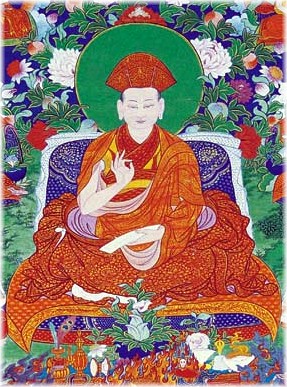Pema Karpo: Difference between revisions
mNo edit summary |
No edit summary |
||
| (13 intermediate revisions by 3 users not shown) | |||
| Line 1: | Line 1: | ||
''' | [[Image:Pemakarpo.jpg|frame|'''Pema Karpo''']] | ||
'''Künkhyen Pema Karpo''' (Tib. ཀུན་མཁྱེན་པདྨ་དཀར་པོ་, [[Wyl.]] ''kun mkhyen pad+ma dkar po'') aka '''Ngawang Norbu''' (Tib. ངག་དབང་ནོར་བུ་, Wyl. ''ngag dbang nor bu'') (1527-1592) was the fourth Gyalwang Drukpa. He was a great scholar and accomplished master of the [[Drukpa Kagyü]] school. Gene Smith writes, "The breadth of his scholarship and learning invites comparison with the [[Fifth Dalai Lama]]. It was he who systematized the teaching of the Drukpa sect." <ref>''Among Tibetan Texts'', p.82</ref> | |||
[[Category: | ==Writings== | ||
He composed 24 volumes of writings including a history of Buddhism, a commentary on the ''[[Bodhicharyavatara]]'', and an in-depth study<ref>see '''[[Herbert V. Guenther]]:''' ''Meditation Differently'', Padma Dkar-po's 'Definitive Investigation of the Four Tuning-in Phases', Delhi 1992.</ref> of the [[Four yogas]], Tib. ''rnal 'byor bzhi'i nges pa rab tu dbye pa phyag rgya chen po'i bshad pa thams cad kyi bla ma'' | |||
*'''Notes on Mahamudra''' ({{TBRCW|O01CT0023|O01CT0023d1e2754$W10736|རྣལ་འབྱོར་བཞིའི་ངེས་པ་རབ་ཏུ་དབྱེ་བ་ཕྱག་རྒྱ་ཆེན་པོའི་བཤད་པ་ཐམས་ཅད་ཀྱི་བླ་མའོ།}}) | |||
*'''The Six Cycles of Equal Taste in a Nutshell''' | |||
*'''Distinguishing the Four Yogas with Certainty''' | |||
*'''Pointing Out the Sublime Essential Meaning''' (''rnal 'byor bzhi'i bshad pa don dam mdzub tshugs su bstan pa'' | |||
==Incarnations== | |||
There were two immediate incarnations of Künkhyen Pema Karpo: [[Paksam Wangpo]] who stayed in Tibet and [[Shabdrung Ngawang Namgyal]] (1594-1651) who went to Bhutan in 1616, where he introduced the Drukpa Kagyü teachings. | |||
==Notes== | |||
<small><references/></small> | |||
==Further Reading== | |||
*E. Gene Smith, 'Padma dkar po and His History of Buddhism' in ''Among Tibetan Texts'', Boston: Wisdom, 2001 | |||
*Michael Broido, 'Padma Dkar-po on Tantra as Ground, Path and Goal' in ''The Journal of the Tibet Society'', Volume 4, 1984 | |||
*Michael Broido, 'Padma Dkar-po on Intergration as Ground, Path and Goal' in ''The Journal of the Tibet Society'', Volume 5, 1985 | |||
*Michael Broido, 'Padma Dkar-po on the Two Sātyas' in ''Journal of the International Association of Buddhist Studies'' 8.2, 1985 | |||
*Padma Karpo Ngawang Norbu, ''The Practice of the Co-Emergent Mahamudra'', translated by Ven. Anzan Hoshin sensei, Ottawa: Great Matter Publications, 1991 | |||
==Internal Links== | |||
*[[Gyalwang Drukchen Incarnation Line]] | |||
==External Links== | |||
*{{TBRC|P825|TBRC Profile}} | |||
[[Category:Drukpa Kagyü Masters]] | |||
Latest revision as of 11:36, 22 August 2019

Künkhyen Pema Karpo (Tib. ཀུན་མཁྱེན་པདྨ་དཀར་པོ་, Wyl. kun mkhyen pad+ma dkar po) aka Ngawang Norbu (Tib. ངག་དབང་ནོར་བུ་, Wyl. ngag dbang nor bu) (1527-1592) was the fourth Gyalwang Drukpa. He was a great scholar and accomplished master of the Drukpa Kagyü school. Gene Smith writes, "The breadth of his scholarship and learning invites comparison with the Fifth Dalai Lama. It was he who systematized the teaching of the Drukpa sect." [1]
Writings
He composed 24 volumes of writings including a history of Buddhism, a commentary on the Bodhicharyavatara, and an in-depth study[2] of the Four yogas, Tib. rnal 'byor bzhi'i nges pa rab tu dbye pa phyag rgya chen po'i bshad pa thams cad kyi bla ma
- Notes on Mahamudra (
 རྣལ་འབྱོར་བཞིའི་ངེས་པ་རབ་ཏུ་དབྱེ་བ་ཕྱག་རྒྱ་ཆེན་པོའི་བཤད་པ་ཐམས་ཅད་ཀྱི་བླ་མའོ།)
རྣལ་འབྱོར་བཞིའི་ངེས་པ་རབ་ཏུ་དབྱེ་བ་ཕྱག་རྒྱ་ཆེན་པོའི་བཤད་པ་ཐམས་ཅད་ཀྱི་བླ་མའོ།) - The Six Cycles of Equal Taste in a Nutshell
- Distinguishing the Four Yogas with Certainty
- Pointing Out the Sublime Essential Meaning (rnal 'byor bzhi'i bshad pa don dam mdzub tshugs su bstan pa
Incarnations
There were two immediate incarnations of Künkhyen Pema Karpo: Paksam Wangpo who stayed in Tibet and Shabdrung Ngawang Namgyal (1594-1651) who went to Bhutan in 1616, where he introduced the Drukpa Kagyü teachings.
Notes
- ↑ Among Tibetan Texts, p.82
- ↑ see Herbert V. Guenther: Meditation Differently, Padma Dkar-po's 'Definitive Investigation of the Four Tuning-in Phases', Delhi 1992.
Further Reading
- E. Gene Smith, 'Padma dkar po and His History of Buddhism' in Among Tibetan Texts, Boston: Wisdom, 2001
- Michael Broido, 'Padma Dkar-po on Tantra as Ground, Path and Goal' in The Journal of the Tibet Society, Volume 4, 1984
- Michael Broido, 'Padma Dkar-po on Intergration as Ground, Path and Goal' in The Journal of the Tibet Society, Volume 5, 1985
- Michael Broido, 'Padma Dkar-po on the Two Sātyas' in Journal of the International Association of Buddhist Studies 8.2, 1985
- Padma Karpo Ngawang Norbu, The Practice of the Co-Emergent Mahamudra, translated by Ven. Anzan Hoshin sensei, Ottawa: Great Matter Publications, 1991